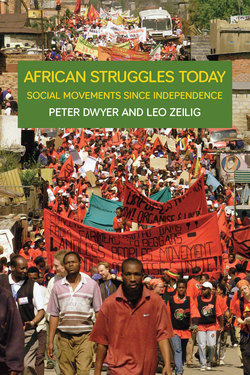Читать книгу African Struggles Today - Peter Dwyer - Страница 3
На сайте Литреса книга снята с продажи.
ОглавлениеAcknowledgments
“Social movements of the world, let us advance towards a global unity to shatter the capitalist system!”
—Final Declaration of the Social Movements Assembly
World Social Forum, February 10, 2011, Dakar, Senegal
This book is a reflection of our interest in the resistance to oppression and exploitation by the peoples of Africa. We have been writing, working, living, and visiting in parts of Africa for twenty years and we draw many lessons and much inspiration from its extraordinary history of struggle. A fundamental premise of this book is a recognition that social change is about more than just “great leaders”; change is often driven “from below” by those who are excluded from the pages of academic and historical books. This book is a story about the puzzled, disillusioned, well-organized, and angry men and women who continue the struggle to transform their lives and societies for the better.
The roots of this book go back to our attendance at two workshops in Johannesburg. The first was conducted by the Southern Africa Centre for Economic Justice and the other by the Congress of South African Trade Unions (COSATU). It struck us that among a group of progressive academics, researchers, activists, and non-governmental organizations (NGOs) from Southern Africa, little was collectively known about the condition and political role of progressive civil society organizations (CSOs) in the region. At the two-day planning workshop on political education, the fifteen or so participants admitted they knew little about the state of civil society in Africa. There was a practical gap in knowledge within Africa and between movements in the global south and north. There was also a tendency to uncritically romanticize nationalist movements, while in the north and at various social forums there was much talk of one united anticapitalist movement. We have sought to integrate an analysis of the complexities of the continent’s recent history with an understanding of really existing movements.
We owe an enduring debt to Miles Larmer for undertaking much of this research with us. The book would never have been completed were it not for his involvement, his research, and the lengthy discussions (and comradely disagreements) we had with him. If he did not agree with the conclusions the book reached, this only serves to illustrate what complex and important work this is.
We must also thank Anthony Arnove and Julie Fain at Haymarket Books, who have encouraged and supported us with the book from the start. David Whitehouse has been central to the painful process of completing the book. He read and edited various drafts very closely and provided invaluable advice and criticism. Sarah Grey deserves thanks as well for her painstaking work on the completed manuscript. Thanks to Emily Albarillo for proofreading.
The book also, in part, reflects an ongoing working relationship with David Seddon, who has so often shared with us his passion and deep understanding of the issues that have long preoccupied us. We have also benefited from the long-standing solidarity and comradeship of Femi Aborisade, Tafadzwa Choto, and Andy Wynne. We have both been inspired and influenced for years by Alex Callinicos and Colin Barker; their influence on us can be found in these pages. Colin’s own research on social movements, which manages to be both highly original and grounded in Marx’s writing and method, has helped shape many ideas in this book.
Peter Dwyer, Oxford
Leo Zeilig, London
April 2012
